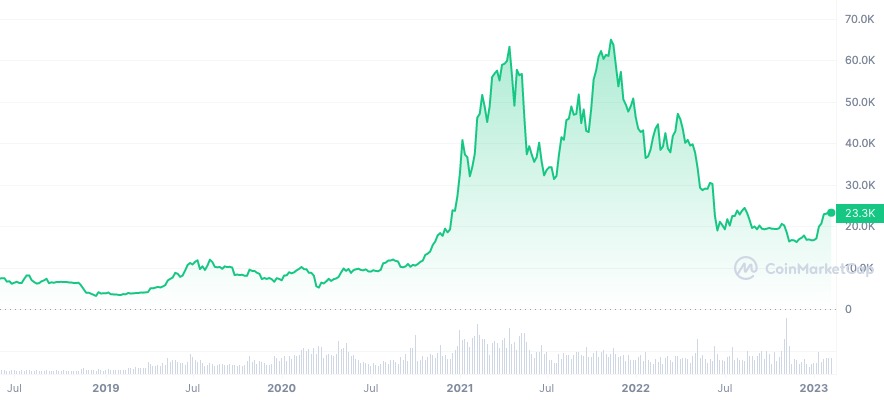Is Bitcoin a good investment? As we saw cryptocurrency prices collapse in 2022, continuing into this year, a lot of people are asking the question: is Bitcoin a good buy now?
In November 2021, Bitcoin reached a total market capitalisation of US$1.28 trillion as it eclipsed US$69,000. Since then, it has been on a steady decline, and at the time of writing is exchanging hands for around US$23,300.

Should investors be concerned or is now the time to buy Bitcoin? There’s no right answer as it depends entirely on individual circumstances, as well as risk appetite and knowledge of the asset.
While we are not in the business of giving advice, we love to help people understand fact from fiction so they can make up their own mind.
In this piece, we look at the pros and cons of investing in Bitcoin and aim to help you determine for yourself – is Bitcoin a good buy now or should you rather steer clear?
What is Bitcoin and how does it work?
First, let’s make sure we are all on the same page in terms of understanding what Bitcoin actually is.
Bitcoin inventor, Satoshi Nakamoto, explained Bitcoin’s purpose in the original 2009 whitepaper saying it was:
“A purely peer-to-peer version of electronic cash would allow online payments to be sent directly from one party to another without going through a financial institution.”
You can think of Bitcoin as digital money. The money we use everyday is known as a ‘fiat currency’ and this includes the US dollar, Australian dollar, Argentine peso and close to 200 others.
What makes Bitcoin different is that it isn’t issued or controlled by any centralised entity or authority. It is regulated by a set of rules that are enforced by a network of decentralised participants comprising nodes and miners. Nobody owns or controls Bitcoin and anyone can participate.
The other part that is important to understand is how Bitcoin works. Bitcoin transactions are peer-to-peer, which means they go directly from the sender to the receiver without a third party in the middle.
In practice, Bitcoins are sent to a Bitcoin address — a string of numbers and letters — so in that sense it is pseudonymous and not anonymous. Bitcoin uses the decentralised peer-to-peer network to distribute blocks and transactions.
How is a Bitcoin created? By miners who compete to solve a hashed algorithm using specialised hardware for the block reward and fees. Presently the block reward is 6.25 Bitcoins and that figure halves every four years or so.
Finally, the critical piece with Bitcoin is that there are only ever going to be 21 million issued. As seen in the graph below, within 10 years, 99% of all Bitcoins that will ever be mined will have already been issued.
To learn more about Bitcoin, check out our handy guide.
Is Bitcoin a good investment? How to buy Bitcoin
The Chainsaw also put together a killer guide on how to buy Bitcoin, step-by-step. However, at a high-level it works like this:
- Pick a trusted cryptocurrency exchange and make sure to do your research.
- Complete the know-your-customer (KYC) requirements which involves proof of identification and address.
- Deposit fiat currency (US dollars or Australian dollars for example) onto the crypto exchange.
- Buy as much Bitcoin as you like.
Simple enough? Of course, there are nuances involved and we’d encourage you to read our guide if your a beginner and just getting into the space.
Bitcoin wallets
Let’s say you’ve bought your Bitcoin from a trusted exchange. What happens after you buy Bitcoin?
One of the most important rules in Bitcoin to understand is “not your keys, not your coins”. What that means is that if you leave your Bitcoin on an exchange, you don’t actually own your them. Instead, you have a claim (like an IOU).
To truly own your Bitcoin, you need to take it into self-custody, and this is where a wallet comes in. A wallet stores your private keys to your Bitcoin and once the Bitcoin is transferred to the wallet, only then can you be said to ‘own’ your Bitcoin.
Now it gets a little complicated, but there are two types of wallet – hot and cold. Hot wallets are connected to the internet, cold wallets aren’t. Hot wallets are therefore more prone to being hacked, unlike a cold wallet which is offline.
There are no solutions, only trade-offs. To really get a handle on how to self-custody into your own Bitcoin wallet, The Chainsaw has a useful guide to get you on your way.

Is Bitcoin a good buy now?
As we said from the outset, we don’t give financial advice. Instead, we aim to give you the information you need to make up your own mind.
People invest in different assets for different reasons, but as a general rule, it’s rarely advisable to invest significant amounts into something you don’t understand.
Bitcoin is the type of asset that you can educate yourself on as there are plenty of people who have been in the field for well over a decade that can help you navigate the space.
These include Andreas M. Antonopoulos, Dr. Saifedean Ammous (author of ‘The Bitcoin Standard’), Jeff Booth, Dan Held, Samson Mow and many more. Be wary of YouTube influencers promising that Bitcoin will ‘go to the moon’, as no credible thought leaders in the space are involved in short-term predictions.
Pros
There is no exhaustive list of the benefits to investing in Bitcoin. As highlighted above, everyone is different, but these are the main reasons you may wish to consider investing in Bitcoin:
- Outsized returns – Bitcoin has been the best performing asset class over extended periods of time, beating shares and the US stock market.
- Store of value – Bitcoin has maintained purchasing power over periods exceeding 3 years and is seen as ‘digital gold’ due to its fixed supply. Many therefore look at is a long-term savings vehicle.
- Decentralisation – Bitcoin is truly decentralised enabling users to verify the fixed supply and network rules themselves with around US$250 worth of hardware. This is the important piece of decentralisation that matters. Since a node is relatively easy and cost effective for individuals to run, it makes it near-impossible to censor the Bitcoin network. By contrast, other blockchains have larger hardware requirements and often, this is outsourced to cloud providers who could be censored.
- Permissionless – Bitcoin enables users to send and receive funds anywhere 24/7 in the world within 10 minutes on the main chain, or instantaneously through the layer two protocol, the Lightning Network.
- Cannot be confiscated – Since Bitcoin is decentralised and users can take their coins into their own custody, users’ Bitcoin cannot be arbitrarily confiscated by governments or any third party. While this isn’t a huge concern for many in Western nations, it can offer a lifeline to political dissidents and ordinary people living under authoritative regimes (over 53% of humanity).
- Divisibility – You can buy as little as US$1 in Bitcoin, you don’t have to buy a whole coin. Each Bitcoin is divided into 100 million ‘Satoshis’ (also known as ‘sats’). Many first-time investors confuse price and value. Just because a token is worth US$0.0001 doesn’t mean it offers more value than one that is US$50,000.
Cons
Once again, there is no definite list of cons as it ultimately is determined by personal circumstances, preferences and appetite for risk. Anyway, here are some of the cons you may want to know about:
- Volatility – This is hardly news to most people as Bitcoin has a much higher rate of volatility than other asset classes such as shares, real estate or bonds. Volatility works both ways — both up and down – and for many people, that is too stressful and doesn’t match their risk appetite. If you’ve got a low risk tolerance you may want to consider whether Bitcoin makes sense for you.
- Complexity – Some like Michael Saylor have argued that you need to dedicate at least 100 hours to understand Bitcoin and educational platforms like Looking Glass Education suggest that is probably accurate. Linked to the first issue, if you don’t understand the asset then chances are that downside volatility is going to shake you from your position and make you want to sell. If you’re not keen to invest the time to understand Bitcoin, perhaps reconsider whether it makes sense to invest.
- Regulation – Some people believe Bitcoin is challenging national currencies and a lot of countries don’t like that. Since people can trade their Bitcoin on regulated exchanges, there is a risk that many countries effectively block the on and off-ramps to prevent you from cashing in on your investment. In addition, many governments are expressing concern around Bitcoin’s energy consumption and there is a risk that the sector becomes increasingly regulated.
- Security – Since Bitcoin is designed to be self-custodied, it places a responsibility on users to take the necessary precautions. Since Bitcoin is complex and takes time to understand, there is a risk of beginners making security mistakes and losing access to their coins. Unlike the traditional financial system, with Bitcoin, there is no helpline to contact if you make a mistake, you can’t undo your mistakes. The Chainsaw has previously covered the issue of storing crypto and what you can do to reduce the risks.
For complete beginners, volatility is often the biggest issue, followed closely by the technical complexity. However, with that said, everyone is different.
Is Bitcoin a good investment? Do I need to pay tax on Bitcoin?
Now this one is a difficult question as it really depends on where you live and the applicable tax regime. Virtually all countries treat Bitcoin (and other digital assets) differently, to some or other degree.
While there are exceptions, most countries will require you to pay tax on Bitcoin gains.
The Chainsaw has a useful explainer for Australian readers that is certainly worth digging into. However, for those elsewhere there are some rough guidelines:
- If Bitcoin is treated as legal tender (such as in El Salvador), there are no taxes applicable when you spend or cash out.
- In most regions including the US, Australia and UK, you pay capital gains tax on Bitcoin gains.
- Some countries (such as the US and Australia) offer a 50% discount on capital gains if you held the Bitcoin for more than 12 months. For example, if you bought a Bitcoin for US$20,000 and then sold it a year later for US$60,000, the gain would be US$40,000, however you’d only pay tax on US$20,000 (half the gain).
Tax is complicated and varies from country to country. While we can say that most countries require you to pay tax on your Bitcoin, it really depends on your personal circumstances.
In short, to get a definitive answer, speak to a professional.
How to make money by investing in Bitcoin
The main way people make money in Bitcoin is by buying and holding for a long period.
While some people have been lucky to buy a chunk of Bitcoin at a relatively low price, Bitcoin’s volatility means that many people are often hanging around on the sidelines waiting for it to drop, only to FOMO in later when it shoots up.
To smooth out the volatility and play the game of “time in the market, not timing the market”, Bitcoin OGs recommend that you simply dollar-cost average (DCA) and stack sats (little fractions of a Bitcoin). That way, you don’t have to ask yourself the question: is Bitcoin a good buy now?
To demonstrate the power of regular Bitcoin purchases without regard to price, there are several DCA calculators. As the illustration below reveals, even at current depressed prices, US$50 a week would provide you with a 44% return over the past four years.
There are some other ways to make money in Bitcoin such as ‘shorting’ it, that is, betting it will go down rather than up. Importantly, that’s best left to professionals as it is complicated and has not proven successful for the vast majority of investors.
Earn Interest
Another way to make money from Bitcoin is to give it to an exchange and earn interest on it. Of course 2022 was the year that many of the interest earning products failed, most obviously FTX and BlockFi to name a few.
The way it works is that a user deposits their coins with a crypto exchange who acts as custodian, effectively a bank. In exchange, the user can earn interest on their Bitcoin or cryptocurrency. Many exchanges offer this service including the likes of Binance and Coinbase.
While the upside is clear, the downside is that most users don’t understand what the exchange (custodian) is doing in the background to generate a yield, which it can partially pass onto the user after taking profits. Some exchanges could be conservative while others could be engaging in highly speculative bets to give their users the best return.
Naturally, investors are free to do what they like with their coins and platforms offering a yield will continue to exist. However investors should do their due diligence to ensure the platform they use is reputable and ideally, doesn’t rehypothecate (i.e. lend to others) the Bitcoin.
In general however, most Bitcoiners advocate self-custody and as seen in some parts of the world, may be critical in times of crisis.
Alternatives
While everyone knows that Bitcoin was the first cryptocurrency, at the time of writing, there are 22,474 other tradeable crypto tokens.
Each cryptocurrency or token promises to deliver something unique or different to Bitcoin, and the list of alternative tokens is far too great to explain one by one. Instead, let’s focus on the second largest cryptocurrency by market capitalisation, Ethereum.
Bitcoin vs Ethereum
While some tend to paint them as competitors, in reality, they are doing different things fulfilling different purposes.
Whereas Bitcoin is regarded as a store of value and a potential alternative to traditional fiat currencies, Ethereum is completely different. It is best understood as a platform upon which programmatic contracts can be run and applications can be built out.
They’re both cryptocurrencies built on blockchains, but they have different consensus mechanisms to determine how all nodes within the network agree on its state. Bitcoin uses energy (Proof-of-Work) and Ethereum uses Proof-of-Stake, an alternative that uses far less energy.
Is there a better investment? Well, it depends on who you are and why you’re investing? And of course, who you ask.
If you want something like digital gold that can’t be confiscated, Bitcoin is the better choice.
If you’re interested in technology, ‘composability’ and how blockchains can be used in DeFi (decentralised finance), NFTs or DApps (decentralised applications), then Ethereum is the clear choice.
Is Bitcoin a good investment? Questions to ask yourself before investing in Bitcoin
Do I understand Bitcoin?
As outlined earlier, Bitcoin is complicated and it is worth understanding the basics before jumping in. The more you are wanting to invest, the more you may want to think about understanding Bitcoin. That’s foundational if you want to determine whether it is a good time to buy Bitcoin now.
What percentage of my total portfolio do I want to invest?
Pretty much every financial advisor on the planet would tell you, “dont put all your eggs into one basket”. In other words, don’t go all-in on a single asset.
You need to figure out what makes sense for you given all your personal circumstances. And of course, speak to your financial advisor if you have one.
Is Bitcoin a good investment? How will I handle 80% drawdowns?
Imagine your investment going down as much as 80%. How would you feel? Relaxed or stressed?
Bitcoin is volatile and there have been 80% plus drawdowns in the past and probably, there will be more in the future. Before investing consider your response to that situation.
As a general rule, if you lose sleep over it, your position size is too big. You never want to be losing sleep over an investment.
Do I want to self-custody or use an exchange to hold my coins?
Although Bitcoin was designed to be self-custodied, it isn’t suitable for everyone.
Research what the options are in terms of where you want to hold your coins. Whatever you choose, again, you don’t want to be losing sleep over it.
Is Bitcoin a good investment? Conclusion
Circling back to where we started, is Bitcoin a good buy now? We can’t tell you whether it is or isn’t, that’s for you to decide.
The most important thing though is to make sure that whatever decision you make, you have all the facts in front of you. Otherwise, you’re walking around in the dark and likely to get hurt.





